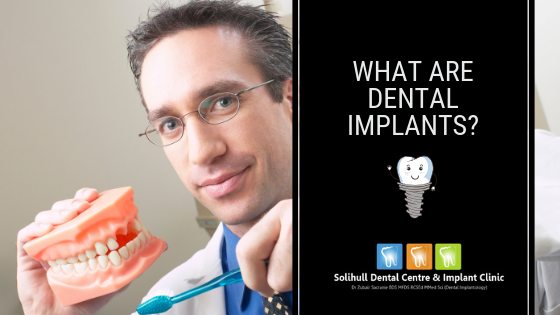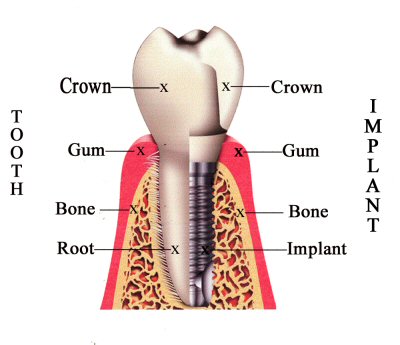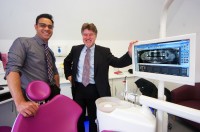
When your dentist undertakes complex treatments such as dental implants and they will often want to know what lies beneath the surface of your gums and teeth, this is where a CT scan comes into its own.
CT stands for computerised tomography, the CBCT (Cone Beam Computerised Tomography) scanner is a specially designed machine that uses x-rays in a cone beam, typically used for medical imaging.
A CT scan creates a series of x-ray images with superior image quality, these images are then pieced together using advanced computerised technology to form a series of slices. Your dentist can then view the internal structures of your head, face and neck in 3 dimensions and with a high degree of accuracy.
A CBCT scanner, such as the ones used in dentistry typically emit a lower level of radiation than the larger scale CT scans found in your hospital outpatient department.
What can be seen on a CT scan?
Your dentist will be able to accurately plot the location of the bony structures around your face, nasal cavity and sinuses. This allows them to evaluate any ongoing disease and also to plan for surgical treatments. A dental Cone Beam scanner doesn’t have quite as much detail as an outpatient CT scan and therefore cannot be used to evaluate soft tissue structures like muscles, lymph nodes, nerves and glands.
Why does my dentist need me to have a CBCT scan?
With Cone Beam scanner is becoming more affordable there are more and more dental practices now acquiring this advanced piece of equipment, they use it primarily for the following purposes:
- To plan accurate placement of dental implant prior to surgery.
- Evaluation of bone quantity prior to dental implant placement, particularly with regards to sinus location and determination of possible grafting/sinus lift treatments.
- Evaluation and location of vital nerve canals prior to dental implant placement.
- Planning of surgical extraction of impacted wisdom teeth.
- Detection and monitoring of jaw tumours.
- locating and identifying pathological origins of chronic pain.
How to prepare for a dental CT scan
You will be pleased to hear that there is very little preparation required for a dental CT scan.
Your dentist will need to have a clear view of your head, face and neck during the scan, any item which could interfere with the image needs to be removed, this includes:
- Earrings.
- Tongue piercings.
- Nose piercings.
- Facial piercings.
- Necklaces.
- Spectacles.
- Hearing aids.
- Hair grips or pins.
- Removable dental appliances (see notes below).
NOTE: We recommend that you don’t come to the dentist wearing any of the above items APART FROM removable dental appliances, please wear these to your appointment as the scan may be required with the appliance in.
What will happen during a CBCT scan?
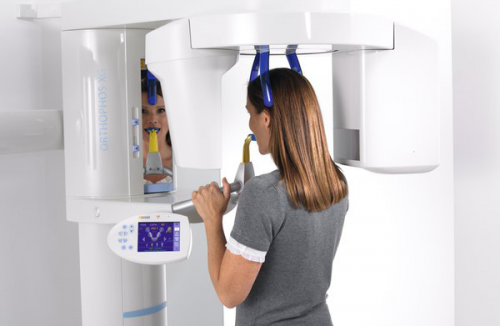
Unlike outpatient CT scans at a hospital where you lie down, a dental scan is usually done with you standing.
You simply stand in a marked area in front of the scanner, you hold onto the bars in front of you and then guides will be put in place to hold your head stationary.
The scanner then rotates around your head taking a whole series of images which the software then rearranges into a 3-D x-ray.
The whole process takes only a few minutes and is completely non-invasive.
Dental CT scan risks
How safe are dental X-rays?
Dental Cone Beam CT scan is have a far lower radiation dose than conventional CT scans that you would receive in hospital department, they do however have a higher level of x-ray radiation than you would usually receive from a standard x-ray. Your dentist will therefore try to keep the number of scans you have to a minimum.
It’s worth noting that older patients (patients over 60) have a lower risk of radiation exposure as their older teeth use are less sensitive to the effects.
If you are pregnant you should also mention this to your dentist as they can then modify the scan or make alternative arrangements.
Can a CT scan cause cancer?
A single or limited number of CT scans are highly unlikely to cause cancer as the radiation dose is not high enough. This is particularly true with adults and older people.
If you have had recent CT scans you should mention this to your dentist so that they can take the dose into account when deciding when and if you should have a further CBCT scan.
How does metal affect a CT scan?
X-rays work by travelling through objects and then creating an image of varying densities. The denser the matter the x-rays trying to go through the darker the image comes out on the x-ray. Soft tissues therefore virtually imperceptible where as bone comes out as a white area. Because metal does not allow x-rays through they can obscure the bone (which your dentist needs to see) behind the metal structure.
For this reason, jewellery and any other metal object should be removed from the head, face and neck pry tourists can if at all possible.
Can you wear full plastic dentures during a neck CT scan?
There should not be any negative effect on the CT image if you wear full plastic dentures. You may however sometimes be asked to remove the dentures prior to the CT scan, it really depends on what type of image your dentist is looking for.
If you wear full dentures it is advisable to discuss this with your dentist and remember, they are used to seeing you without any teeth in!
How is a CBCT used for dental implants?
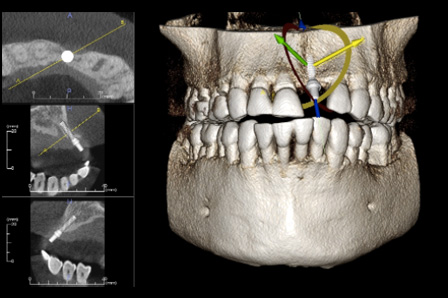
A CT scan is used in the diagnostic phases of dental implants, many of the Cone Beam scanner software installations communicate directly with dental implant planning software applications and platforms. This allows your dentist to virtually place a dental implant prior to the surgical phase, all done on the computer..
Dental implants come in a variety of lengths and widths and using the CT scan 3-D images your dentist can plan the precise length and width of each implant with absolute clarity and precision.
In some instances the resultant CT scanning can then be exported to CADCAM software which can then provide a dentist with a physical implant guide. This implant guide will fit over your existing teeth and have a hole through which the dental implant will be placed, this hole will be at the precise angle that the dentist needs to drill in order to place the dental implant.
This makes planning and treatment of dental implants highly accurate.
CBCT scans in Solihull
Solihull Dental Centre and Implant Clinic are proud to announce that they have now purchased a Cone Beam scanner. The scanner will be used for a range of diagnostic purposes including complex orthodontics, pain, dental implants and jaw joint problems.



